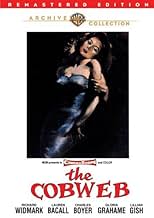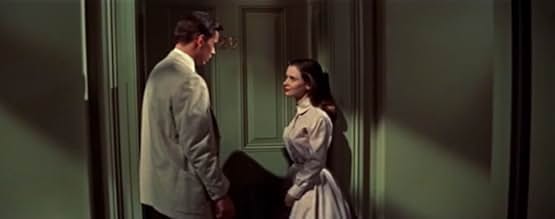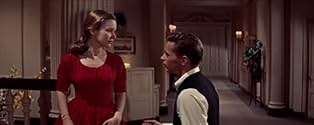Dans une clinique psychiatrique, les drames quotidiens et les interactions entre les médecins, les infirmiers, les administrateurs, les bienfaiteurs et les patients sont accentués par les cr... Tout lireDans une clinique psychiatrique, les drames quotidiens et les interactions entre les médecins, les infirmiers, les administrateurs, les bienfaiteurs et les patients sont accentués par les crises personnelles et familiales de ces individus.Dans une clinique psychiatrique, les drames quotidiens et les interactions entre les médecins, les infirmiers, les administrateurs, les bienfaiteurs et les patients sont accentués par les crises personnelles et familiales de ces individus.
- Réalisation
- Scénario
- Casting principal
Avis à la une
How it ever got the green light from the studio is mystery number one, that Vincente Minnelli said okay to directing it is the second although that would explain why so many great actors allowed themselves to be involved.
Everybody gives overheated performances except Lauren Bacall who keeps a low-key dignity amongst the melodrama and Susan Strasberg offers a restrained quiet portrait of a shut-in who is making her first tentative steps towards reemerging into the world.
The rest of the players aim for the rafters to varying degrees from Richard Widmark's impassioned but distracted doctor who is merely agitated then there is Lillian Gish who chews a bit of scenery as a bitter spinster as well as many other respected actors who show little restraint.
The real standout though is Gloria Grahame as Richard's hot mess of a wife, she seems to realize how silly the whole thing is and pitches her performance to that tempo, she's jittery, flouncy and fun plus she looks great.
Laughable take on mental health but good for one fun viewing as a camp catastrophe.
It's an absorbing story of the patients and the doctors at a mental institution. Widmark has basically taken over from the troubled Boyer - though Boyer retains his title, Widmark's contract gives him more power. Bacall, a recent widow, is a doctor on staff, and Lillian Gish is an administrator. The patient most focused on is Stevie, played by John Kerr. He is making good progress with his recovery, and in fact, some of the better patients are given control over designing their lounge. The sticking point becomes the draperies which become a political football. Widmark's wife, Gloria Grahame, wants to impose herself onto the institution that is taking her husband away from her by working with a board member on the drapes; Lillian Gish wants to save money and go the cheap route; and the patients have their own ideas.
This is a very good drama with good acting from all involved. Grahame is a brunette here and has never been more beautiful, plus she gets to wear some beautiful clothes. She, along with the others, gives a terrific performance.
The one with the best role is Lillian Gish, and she is fantastic. What an actress and what a career. Who could have believed she could play such a perfect bitch? Well worth watching if the plot is a little thin.
Richard Widmark is a new psychiatrist whose new methods allow granting of more freedom of the grounds to the inmates. What Widmark's character might think today of the number of patients walking around completely free today with only our trust that they will take their medications is interesting to speculate. Anyway it puts him at odds with Charles Boyer who is the medical head of the place.
Boyer is a man beset with problems of his own of a personal nature, he's drinking and wrenching around openly, a man going through a midlife crisis and playing it out in front of everyone including all the enemies he's made. Widmark however as a former disciple of his can't quite pull the trigger to get rid of him.
And Widmark is having his own problems, a neglected wife in Gloria Grahame and a fetching Lauren Bacall to tempt him.
But the best performance of the film comes from that grand old lady of the screen, Lillian Gish. She's the civilian record keeper of the place and a politician to the max. She plays off Widmark and Boyer, in fact The Cobweb would have been a better film had she been the central character. There's also a real good performance by Olive Carey as a Ratched like nurse, Ms. O'Brien.
John Kerr, Susan Strasberg, and Oscar Levant are all inmates of the place which is a rather posh establishment for the richer brand of neurotics. You can't imagine Widmark trying his experiments in freedom on the inhabitants of The Snake Pit.
The Cobweb is a film whose parts are greater than the whole effort. It could have been a whole lot better than it was given the talent involved.
People fret about the drapes--well really they're only the trigger for the clash. I have the strong feeling that by leaving Chicago to settle in this back-water, McIver has made a mountain of trouble for himself. His wife Karen (splendid performance by Gloria Grahame) is experiencing severe boredom and frustration; she's a sensual romantic woman who is being ignored by her husband, who is trying to find romance with Meg Rinehart (a cool Lauren Bacall). The romantic disappointments of the main characters make this film work.
What's interesting is that there is no antagonist; like "Howards End" or Eastwood's "Unforgiven", all the characters do bad things for understandable reasons and thus construct the cobweb. This compares favorably with other nuthouse movies, especially ones about the group therapy system--"Cuckoo's Nest" (based on Ken Kesey's novel of 1950, 5 years before "Cobweb") and "The Caretakers" with Joan Crawford as the inflexible head nurse. Those films tend to focus on patients having hysterics and running riot. They don't indict the system but one despotic individual within it (a head nurse); Kesey's narrator claims that she represents a larger controlling force but even then shows that other wards in the hospital are not the same. However, "Cobweb" takes a more subtle nobody's-fault approach that ultimately has wider, darker implications. It implies that these pitfalls are endemic to the system because they are part of human nature, which is a more sinister idea (especially for the 50s) than being able to blame a convenient mini-Hitler. Therefore, it works more convincingly as a microcosm of a society that thinks it's healthy. It's also more salutary and hopeful than those films because it proceeds from this clear-eyed cautionary assessment.
In the true sense of "melodrama," it underlines apparently innocuous early scenes with heavy foreboding music by Leonard Rosenman. It's also astonishing to watch Lillian Gish play a b----. And she does a great job.
Le saviez-vous
- AnecdotesMarks the return of Lillian Gish to MGM after a 22-year absence. The Cobweb was Lauren Bacall first film for MGM.
- GaffesWhen Karen (Gloria Grahame) storms into her bedroom and kicks off her shoes, she apparently launches the first one over the walls of the set, as it shoots straight up toward the supposedly low ceiling but never comes down.
- Citations
Steven Holte: Artists are better off dead.
Karen McIver: Why?
Steven Holte: People pay more attention to them when they're dead. That's what's so troublesome.
Karen McIver: Is that what you are, a painter?
Steven Holte: They said Van Gogh was crazy because he killed himself. He couldn't sell a painting while he was alive, and now they're worth thirty million dollars. They weren't that bad then and they're not that good now, so who's crazy?
- ConnexionsFeatured in Le point de non-retour (1967)
Meilleurs choix
- How long is The Cobweb?Alimenté par Alexa
Détails
- Date de sortie
- Pays d’origine
- Langue
- Aussi connu sous le nom de
- La Toile de l'araignée
- Lieux de tournage
- St. Louis Street, Lot 3, Metro-Goldwyn-Mayer Studios - 10202 W. Washington Blvd., Culver City, Californie, États-Unis(McIver's neighborhood, demolished in 1972)
- Société de production
- Voir plus de crédits d'entreprise sur IMDbPro
Box-office
- Budget
- 1 976 000 $US (estimé)
- Durée
- 2h 14min(134 min)
- Rapport de forme
- 2.55 : 1




























